Mallow Guide Collection and Use in Cooking. Mallow is a very common plant in the whole Mediterranean area and submontane. You can find it in uncultivated grasslands in the ruins of old abandoned houses and along the country roads.
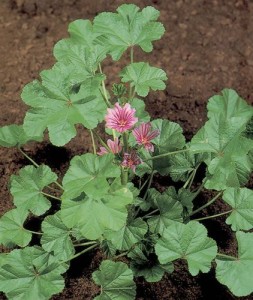
It was one of the first plants that I have learned to recognize, and with great pleasure I remember my childhood, at the age of 7-8 years my grandmother asked me to go and pick mallow to make a decoction to feed the pigs, remember that put on the fire this big pot and threw us into the mauve I had collected, brought to a boil and then was fed to pigs with bran. The grandmother was not aware of the active technical, but as the tradition that had been handed down from generation to generation knew that was good and disinfected. Internet did not exist yet, and the phone and the encyclopedia paper came many years later.
Mallow Guide Collection and Use in Cooking
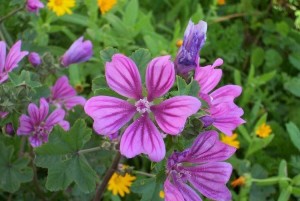
Today everything is easier, mauve and just type "submit", and is pssibile know everything about this plant, shame that many people do not know at all this beautiful plant with 1000 beneficial properties.
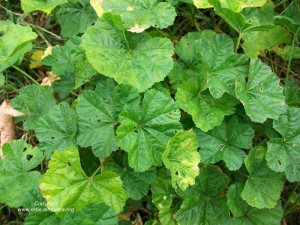
Mallow Guide Collection and Use in Cooking
Properties mallow
It is a herbaceous plant, can reach one meter in height, the stem is covered with hair. The leaves are scattered and petiolate, of different shapes, the flowers are gathered in bundles of the leaf axils, pedunculated with a corolla with five petals pinkish or rosy-purple striae with more charges.
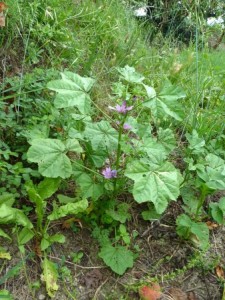
For use in the kitchen or herbal gather leaves and flowers. The leaves are left to dry in the shade then preserved in paper envelopes, the flowers are preserved in glass jars away from direct light.
It is rich in mucilage, contains potassium, calcium oxalate, pectin and vitamine.
Leaves and mauve flowers have the same properties and home treatments can be used separately or blended. Property: lassativa, antiflogistica,emollient, bechica, OFTALMICA.
Preparations mallow attenuate the state of inflammation of the mouth and throat, are expectorants in case of bronchitis and phlegm, soothe inflammation, regulate the intestines and it soothe the pains. They are suitable for the delicate organism of children and the elderly.
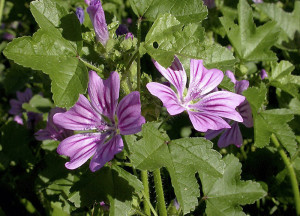
The Malva in the kitchen
Very famous since the time of the Greeks and Romans mallow has maintained its reputation until today. You can eat it raw in salads or mixed with other vegetables. It is really outstanding in soups, risottos and pasta sauce with its slightly sweet flavor. The flowers can be used to soften the dishes, as being edible leaves.
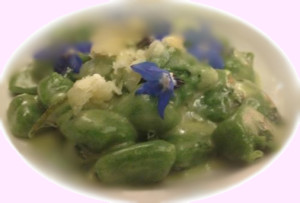
In the kitchen, you can add it to your creations by chopping the leaves and flowers and adding it with the onion, parsley garlic celery and carrots.
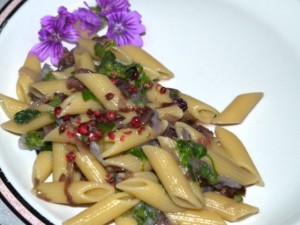
Here are some recipes that you can carry with mauve:
Rice soup and mauve, broth with herbs, broth with mallow, spaghetti with herbs, Gnocchi with mallow, fettuccine with herbs, soup mallow meadows, soup and mauve daisies.
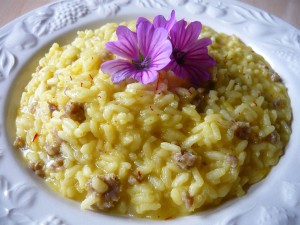
The pizza is delicious mallow, should be treated as a simple vegetable, blanched and rebuilt a few minutes in the pan along with garlic, Tomato, mozzarella and mauve, A delicious pizza with the flavors of the past.
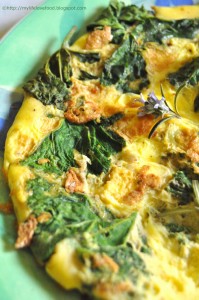
If you prepare the ice for an upcoming party at home, I suggest you put a flower mallow in each ice cube. The result will be very nice to see.
PS: The news published here simply for informational purposes, do not want to lead you to self-diagnosis or self-treatment, for health problems is always advisable to consult a doctor.
To learn more about the mallow, you can consult wikipedia
If you already use the mauve in the kitchen, post your recipe in the comments.
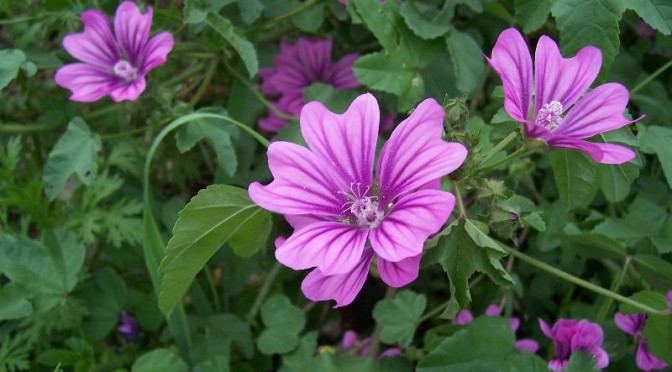
Moroccan cooked mallow (khobizza).
Ingredients : 1 kg of washed and cured mallow(the tender parts beyond the leaf are used) NOT centrifuged, half a lemon in brine (you can prepare it yourself, recipes on the Internet, or in ethnic shops for sale), juice of 1 fresh lemon, olive oil, Taggiasca olives without hazelnuts and one/two mirrors of garlic,chili pepper.
Pour 3 large spoons of olive oil in a pan(the pentola) with lid, low medium heat, add the minced or crushed garlic and brown, then add the mallow, mix well and cover with the lid, turn occasionally until the leaves of the mallow change color and the volume of the mallow decreases, add the pickled lemon cut into pieces similar in size to the cloves of garlic, add the olives, mix and cover, continue stirring, checking that it does not stick to the bottom of the pan, if necessary, add water one can at a time (little so that the mallow is almost wet and should not be immersed in water, it takes approx 20/30 minutes based on the freshness of the plant.
At the end of cooking, add the lemon juice, salt and pepper and cook again for 5 minutes.
It should be served cold as a side dish, often accompanied with fresh bread.
Packed with useful info
I use mallow to make delicious pancakes, covered with cottage cheese or fresh ricotta and garnish with a fresh flower
Thanks Silvana.